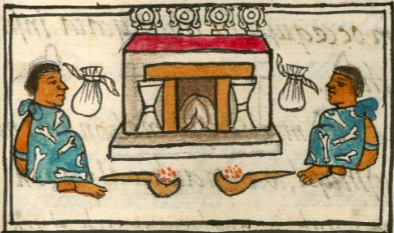icpaxiquipilli (FCbk8f46r)
This iconographic example, featuring a cotton bag (icpaxiquipilli) for carrying incense (copalli) and maguey spines (huitztli), is included in this digital collection for the purpose of making potential comparisons with related hieroglyphs. The term selected for this example comes from the text near the image in the Digital Florentine Codex. This example shows a sack made from white cotton with a tie up near the mouth. Black vertical lines above and below the tie give the bag three-dimensionality, showing European artistic influences The bottom of the sack is rounded, and the bag is apparently full despite not having visible shapes that might convey something of the contents copalli and huitztli. On {a href=”https://florentinecodex.getty.edu/book/8/folio/46v/images/0”>folio 46v one can see how men hold their tlemaitl along with their huitztli, and the latter are fairly large. To put all that together into a cotton sack might be limited to just one’s personal group of materials.
Stephanie Wood
This is the first specifically cotton-cloth bag in this collection. There are some examples of the more generic xiquipilli, which could contain incense, cacao, coins, and other valuables. The earliest ones were of an elaborate design with tassels, fringed tops, and looping handles, and there may have been regional variations, as some were square. Gradually the term xiquipilli shifted to refer to what appeared to be more of a European-style bag, as shown here.
Stephanie Wood
icpaxiquipilli
1577
Jeff Haskett-Wood
bolsa, bolsas, saco, sacos, atado, incienso, espina, espinas
icpaxiquipil(li), a cotton bag for incense, https://nahuatl.wired-humanities.org/content/icpaxiquipilli
xiquipil(li), a sack or bag, or the number 8,000, https://nahuatl.wired-humanities.org/content/xiquipilli
copal(li), incense, resin gum, “copal” in Spanish, https://nahuatl.wired-humanities.org/content/copalli
huitz(tli), spines, often used for self-bloodletting sacrifice, https://nahuatl.wired-humanities.org/content/huitztli
la bolsa de algodón
Stephanie Wood
Available at Digital Florentine Codex/Códice Florentino Digital, edited by Kim N. Richter and Alicia Maria Houtrouw, "Book 8: Kings and Lords", fol. 46r, Getty Research Institute, 2023. https://florentinecodex.getty.edu/en/book/8/folio/46r/images/0 Accessed 24 August 2025.
Images of the digitized Florentine Codex are made available under the following Creative Commons license: CC BY-NC-ND (Attribution-NonCommercial-NoDerivs 4.0 International). For print-publication quality photos, please contact the Biblioteca Medicea Laurenziana ([email protected]). The Library of Congress has also published this manuscript, using the images of the World Digital Library copy. “The Library of Congress is unaware of any copyright or other restrictions in the World Digital Library Collection. Absent any such restrictions, these materials are free to use and reuse.”






